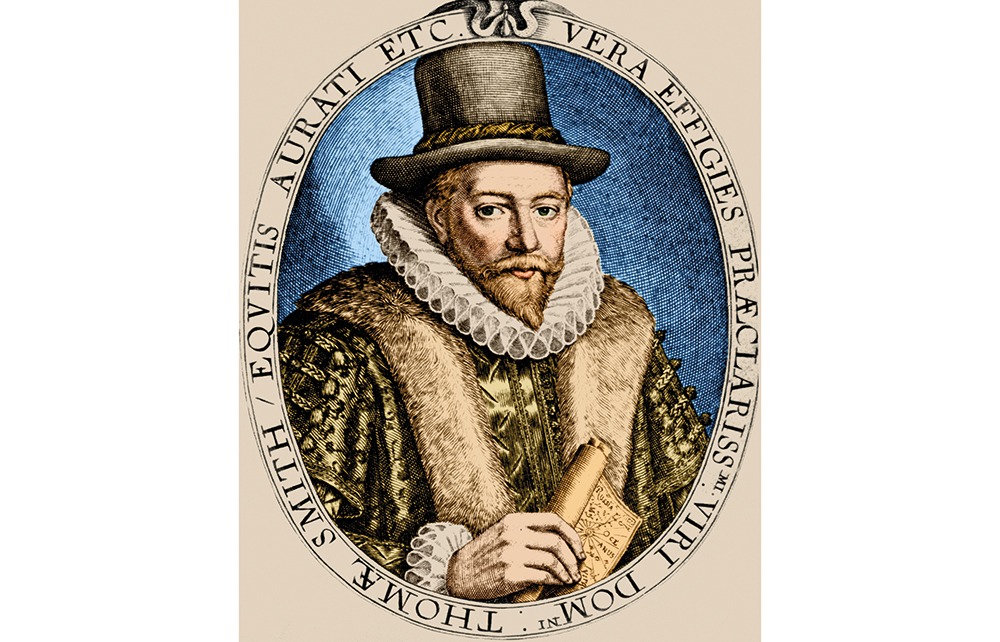Beneath a flinty church tower deep in the Kent marshes, ‘among putrid estuaries and leaden waters’, lies a monument to an Elizabethan man of business. It is not much to look at. David Howarth calls it ‘second rate… dull’ and ‘strangely provisional’, despite its expanse of glossy alabaster. Moreover, the name of the man commemorated will ring few bells, even among historians. But it is the only memorial erected to one of the most important men in English history.
Sir Thomas Smythe was perhaps the greatest businessman in Elizabethan England. He not only founded the East India Company; he also played a leading role in several other significant commercial and pioneering proto-colonial ventures of the age. He started off running the Muscovy Company, the first joint stock company in history; then sat at the helm of the Levant Company, engaged in trade with the Ottoman empire, and was treasurer of the Virginia Plantation, which supervised the early English colonies in the New World. In these various capacities he laid the groundwork for many of the institutions that would do most to propel England from a relatively impoverished country at the edge of Europe to what would become, just a century and a half later, the world’s biggest economy and most successful imperial power.
Portraits of Smythe show a grave, bearded, stovepipe-hatted figure, his face nestled in cambric ruffs. He wore, at different times, many different hats: member of parliament; sheriff and auditor of the City of London; importer of currants from the Greek islands and spices from Aleppo; co-founder of the Levant Company and the Somers Isles (or Bermuda) Companies; and even ‘principal commissioner for the London expedition against ye pirates and for a voyage to ye river Senega[l] upon ye coast of Africa’.
But his most important initiative was to set up the meeting at the Founders Hall in Moorgate Fields, on the edge of London, on 24 September 1599 – around the time Shakespeare must have been pondering the concluding scenes of Hamlet. This was intended to find subscribers to invest in a new company to
venter in a voiage to ye Est Indies and other ilands and cuntries thereabouts there to make trade… by buying or bartering of suche goodes, wares, jewelles or merchaundise as those ilands or cuntries may yeld or afforthe (the whiche it maie please the Lorde to prosper).
Prosper it certainly did. It would eventually become the most powerful corporation in history.
But, as Howarth points out in Adventurers, his swaggering and occasionally baroque survey of Smythe’s world, the East India Company’s success was by no means guaranteed. He shows how important Smythe’s careful direction was in keeping the fledgling company afloat for its first two precarious decades, writing:
What is surprising about the launch of the East India Company is how little was planned and how much less was prepared. Looking at the company in these first chaotic years suggests how wrong it is to think there was something inevitable about its rise as a systematic monolith that was somehow predestined to govern India.
One of the great strengths of Elizabethan England was its lack of condescension to men of business. ‘English court and English commerce were more creatively entwined than any other polity in Europe,’ says Howarth. ‘An absence of snobbery about the grime of commerce characterised key Elizabethans.’ This meant, in turn, that the early East India Company was happy to pursue trade without territorial gain and to focus on profit, not military glory. It was all about ‘rials, not religion, cinnamon, not conquest’. This was a conscious choice. Smythe’s friend Sir Thomas Roe, the first English ambassador to the Mughal court, emphasised that ‘warre and traffic are incompatible,’ and advised against even fortified settlements, pointing out how ‘many rich residences and territoryes [were] beggaring’ the Portuguese trade with unsupportable costs.
This was something that gave the English company a lead over its competitors, notably the French, whose rival Compagnie des Indes was hobbled by the appointments of economically illiterate court favourites, sent out by Versailles to India, where they consistently showed more interest in politics and soldiering than trade. The EIC, in comparison, was fleet-footed and steely in its ruthlessly meritocratic and libertarian approach to profit. The Jacobean writer Lewes Roberts noted: ‘It is not our conquest, but our commerce, it is not our swords, but our sails, that first spread the English name over and about the world.’
Ironically, it was Thomas Smythe’s greatest humiliation that gave the East India Company its greatest break
There is currently something of a renaissance in writing about the East India Company. Nandita’s Das’s Courting India was published recently, and Philip Stern’s Empire, Incorporated is due out shortly. Each of these studies has its own strengths. Stern shows how it was not the nation state so much as joint-stock ‘venture colonialism’ that financed and drove the earliest attempts to found Tudor colonies, from Ulster to Spitsbergen and Virginia to Cathay, as merchant adventurers sailed off to establish outposts that blurred the line between commerce and colonialism. Das paints a beautiful miniature portrait of the Mughal court during the pioneering embassy of Thomas Roe. Where Howarth excels is in his understanding of the domestic background. Adventurers is a history of the company which focuses firmly and expertly on the home front, and contains many details about its English context absent from earlier studies.
With Howarth as our guide we meet ‘the Elizabethan traffic wardens employed to keep things moving in the gridlocked streets’ of London, who ‘found coaches backing right up Eastcheap. Every manner of royal office holder was determined to become an adventurer.’ We explore the growing taste for luxury, and the opening of the Elizabethan mind that ‘allowed an insular nation to become abundant in trade and exuberant in confidence’.
‘What precipitated the launch of the East India Company at that point was a mix of the philosophical and the mundane: critical texts on how society should be best ordained; the slow maturation of a thousand changes in forges and workshops, shipbuilding and cartography; skills honed and enterprise promoted.’
But in the end it was, ironically, Smythe’s greatest humiliation that gave the company its greatest break. The Amboyna massacre, in what is now Indonesia, and the defeat of the company at the hands of the Dutch in 1623, brought about the fall of Smythe, who set off to quiet retirement in the Kent marshes. Crucially, it forced the company to shift its focus from spices to concentrate on textiles instead, and trade with the myriad weavers of Mughal India. As Howarth succinctly puts it: ‘Had the Dutch not got the Spice Islands, the English would not have got India.’
Most of us who write about the East India Company have tended to see it apologetically, through the prism of its later history of conquest. It is fascinating and oddly refreshing to read about the nest in which it was hatched, and view it as part of domestic and not just colonial history. It is an approach which pays ample dividends, and makes Howarth’s study quite different from its rivals, and overflowing with surprises.





Comments